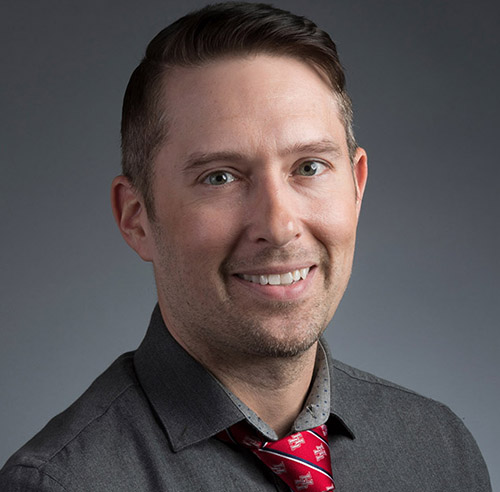Let’s Talk Teaching: Assistant Professor Inspires Students to be ‘Math People’

Posted August 5, 2021 — Clinical Assistant Professor Justin Burris believes anyone can be a “math person.”
Growing up, he was taught that people were either good at math or a lost cause. However, after majoring in elementary education in college, Burris truly understood the power of great teaching. Today, he prepares aspiring teachers at the University of Houston College of Education to be math people so they can instill that same belief in their future students.
"The way we were taught in schools was usually about mathematics as rules and procedures,” Burris said. “We want our teachers to understand that everyone thinks differently because of their culture, backgrounds and communities, and those strategies are valid.”
Burris’ care for his students and creativity in the classroom earned him a 2021 Teaching Excellence Award from UH.
Avery Robicheaux, an alum who nominated Burris for the award, historically did not do well in math class and thought a teaching career was out of reach, but Burris’ coaching helped flip that mindset.
“His approach to teaching broadened my own perspective about the kind of teacher I could become,” said Robicheaux, who recently accepted a virtual teaching position to instruct a fifth-grade math class.
Learn more about Burris, who earned his M.Ed. and Ed.D. from the College, in the following Q&A.
What classes do you teach?
One class is about the understanding of mathematics, how mathematics is very broad, and about relationships and growth mindset. The second two classes are more about pedagogy and teaching. Teacher candidates practice math teaching in my classroom and then enact math teaching in the field with elementary students.
How is a growth mindset key to your teaching?
A growth mindset is a belief that I can change, grow and learn. My learning and growth are not fixed. You hear a lot in schools, “Oh, I’m bad at math.” That’s a fixed mindset. Or you hear teachers saying, “Oh, you’re so smart.” That’s also a fixed mindset because that’s saying that you’re already at the top — you can’t get any better. So, this idea of growth mindset permeates not only through the teacher candidates but also how they see and perceive their future elementary and middle school students.
What advice do you have for your teacher candidates?
It’s important for you not only to have a growth mindset about your own math abilities, but you should have a growth mindset about your current and future students and their math abilities. Our students, pre-K through higher education, bring knowledge, skills, culture, community and family into our classrooms, and we need to find ways to connect with every kid and every teacher candidate for our students to be risk-takers in the mathematics classroom. Our math classrooms should have activities that mirror the students’ identities and experiences as well as windows into the identities and experiences of others.
What do you love most about teaching?
I love when students have that “aha moment” or they make a connection or a new realization. That “aha moment” still happens at university level. When we talk about nine different ways to add, teacher candidates realize there are lots of different strategies and their future students will have different ideas and strategies too.
What are your favorite assignments?
In the content class, they have an assignment where they’re given a math topic, and they have to create a word problem. They have to illustrate that word problem using concrete, pictorial and abstract models in a 10-minute or less video. I really love seeing their connection from what they learned as an elementary student to this more visual idea of mathematics.
In the methods class, they have to record their teaching with elementary students each semester. To see growth from one semester to the next as a teacher is really amazing.
How do you connect with your teacher candidates?
At the beginning of the semester, we do lots of relationship building activities. In the face-to-face class, I usually have students create a life map. I’ve adapted that life map, and it’s on Google Slides. Everyone tells me about themselves, a struggle they have, something positive that’s happening in their life. I share about myself as well.
How has the pandemic affected your teaching?
I still do all the building relationships activities. I think it’s a little more challenging because you’re not face to face with somebody. But I feel like I’m getting better at teaching in the online classroom each semester because I already have online tools we use and visualize math together with.
How do you help your teacher candidates connect with their students?
I provide them with a lot of different activities to get to know their students beyond academic work. You have to make an effort as an educator to build relationships with your students whether it’s pre-K–12 or higher education.
Who inspired you to become a teacher?
My high school chemistry teacher made me change my thinking about not only chemistry and physics but teaching in general. He had a real joy of teaching and knew his students. He knew all their names, a little bit about them, what their extracurriculars were, etc. He was a teacher who would listen to every student, so I try to model that as well.
What is your teaching philosophy?
My general rule is I can’t teach anyone I don’t know. Teaching is all about connections, and we need to make sure that, as educators, we are connecting to our students not just superficially but, more importantly, emotionally. I want my teacher candidates to know that our elementary and middle school students bring a wealth of information, knowledge and experience to our classroom, and our job is to build upon their strengths and what they know. To do that, we need to build relationships.
— By Lillian Hoang